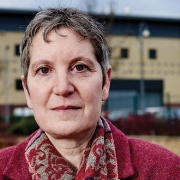
Profile
Dr Naomi Hartree
Age 52
Role Clinical lead for charity Medical Justice, which challenges inadequate healthcare for immigration detainees
Location Head office in north London, with site visits to detention centres including Yarl’s Wood, Bedfordshire
06.00
I get myself and my family ready for work and school. Today I’m doing a detention visit to Yarl’s Wood immigration removal centre in Bedfordshire, so I pack my doctor’s bag. My role involves documenting the health conditions of detainees that are relevant to their asylum cases, so as well as my stethoscope and other standard kit, more grimly I have to bring equipment for documenting scars of torture: body maps, a camera and a tape measure.
08.00
I take three trains and a taxi to the centre, rereading the case summary on the way. I used to be a GP locum in London, but I gave it up a few years ago when I realised how difficult life is for migrants and asylum seekers in the UK and I started volunteering with charities who work with them. This patient is from a country where women are subjugated. She alleges she suffered violence in a forced marriage endorsed by her community. She claimed asylum, but was not believed.
11.00
I arrive at Yarl’s Wood. It looks bleak – a car park, purpose-built brick buildings, and fences topped with spirals of barbed wire. Along with our interpreter and a new volunteer doctor for Medical Justice, I go through security, after handing in my passport, giving my fingerprints and being searched. A nurse holding a chainful of keys escorts us to the consulting room.
My patient is brought in by a guard. We now have two hours in which to establish trust, take a life’s history and examine. The woman weeps and wrings her hands, saying she was imprisoned by her husband and now is locked up again. She has a lot of scars. It’s been six months since she was first detained, but she doesn’t seem to have had much treatment. Maybe she does not trust the doctors here, or can’t communicate with them.
I see a huge variety of conditions in this role. Mental health problems are usual – many of our patients describe histories of war, persecution or loss, and show symptoms of post-traumatic stress disorder or depression.
13.00
I finish the consultation, telling the patient I will write a report that will be sent to her solicitor. We leave – the woman is collected by a guard while the rest of us are escorted out through a discomforting series of metal doors.
15.00
Back in the office, the caseworker and I discuss issues arising from the visit. We set up the next training day for doctors interested in volunteering and I reply to a request to talk to GP registrars about refugee healthcare. A researcher at the next desk asks my advice for a report on healthcare problems among detainees, which we’ll use for policy work.
17.00
A solicitor calls to arrange an urgent telephone assessment for a patient who says he was tortured during the war in his country. The Home Office plans to return him there in a few days, as his asylum claim has been refused. There’s no time to arrange a visit, so we plan a phone consultation tomorrow. Assessing medical history, symptoms and mental state over the phone is more difficult than face to face. I have to choose my questions carefully and listen hard.
17.30
Another solicitor emails me with good news – a detainee I assessed recently has been released, partly thanks to my report on him. I hope this will improve his mental health and make it easier for him to get the treatment he needs.
18.00
I head home to unwind with the family. It’s not part of the job description to work in the evenings, but I sometimes go the extra mile for a detainee who is particularly vulnerable by doing an assessment at short notice and writing the report in an evening or at a weekend.
It’s hard to hear accounts of war and abuse, as well as to see illnesses being made worse by detention. Some patients were apparently coping until being detained, but are extremely unwell by the time we see them. Still, I’m privileged that I can use my medical experience to help vulnerable people – I wouldn’t swap this job for any other.

















